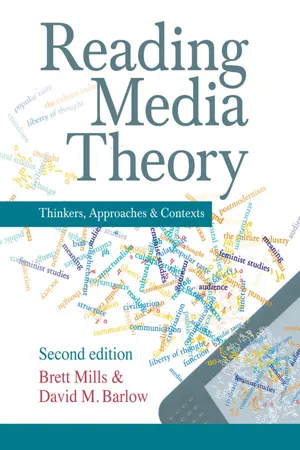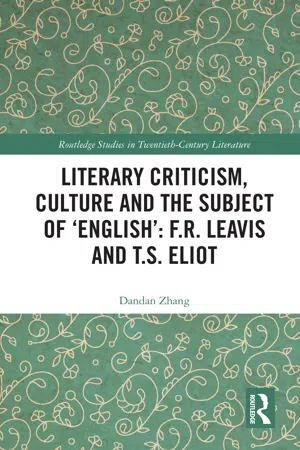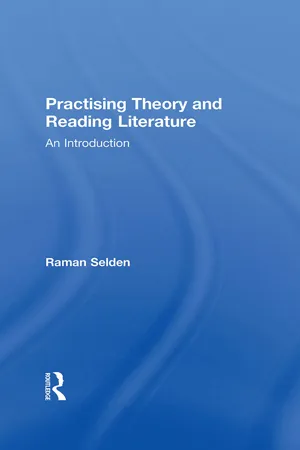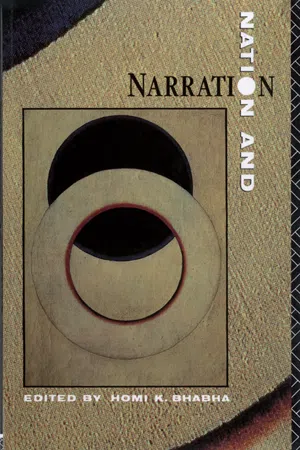F. R. Leavis
F. R. Leavis was a prominent literary critic known for his influential work in the field of literary criticism. He emphasized the importance of close reading and the moral and social significance of literature. Leavis was a key figure in the development of the "Great Tradition" approach to literary studies, which focused on canonical works and their cultural and intellectual significance.
7 Key excerpts on "F. R. Leavis"
- eBook - ePub
- Raman Selden, Peter Widdowson, Peter Brooker(Authors)
- 2016(Publication Date)
- Routledge(Publisher)
...R. Leavis F. R. Leavis and Leavisite criticism, preeminently associated with the journal Scrutiny (1932–53), held sway in British literary studies from the 1930s to the 1960s, if not, in an unconscious form, beyond. He became accordingly the major target for the new critical theory of those later decades. Raymond Williams in Politics and Letters (1979) and Terry Eagleton in Literary Theory: An Introduction (1983) bear witness to just this. Apropos of Leavis’s The Great Tradition (1948), Williams remarks, for example, that by the early 1970s, in relation to the English novel, Leavis ‘had completely won. I mean if you talked to anyone about [it], including people who were hostile to Leavis, they were in fact reproducing his sense of the shape of its history.’ More generally, Eagleton writes: ‘Whatever the “failure” or “success” of Scrutiny … the fact remains that English students in England today [ 1983] are “Leavisites” whether they know it or not, irremediably altered by that historic intervention.’ Leavis, profoundly influenced by Matthew Arnold and by T. S. Eliot (his New Bearings in English Poetry (1932) in effect first taught the English how to ‘read’ The Waste Land), was, like Richards and Empson above, one of the new academics in Cambridge in the late 1920s and early 1930s who turned the English syllabus away from the bellettrism of Sir Arthur Quiller-Couch and others, and put it at the centre of arts education in the university. His collection Education and the University (1943), including the widely influential ‘A Sketch for an “English School”’ and ‘Mass Civilization and Minority Culture’, bears witness to the fact that Leavis was an educator as much as he was a critic, and to the practical, strategically anti-theoretical nature of his work (see also, for example, later works like English Literature in Our Time and the University, 1969, The Living Principle: English as a Discipline of Thought, 1975)...
- eBook - ePub
Reading Media Theory
Thinkers, Approaches and Contexts
- Brett Mills, David M. Barlow(Authors)
- 2014(Publication Date)
- Routledge(Publisher)
...Chapter 5 F.R. Leavis DOI: 10.4324/9781315832975-5 Reading: Leavis, F.R. (1930) Mass Civilisation and Minority Culture, Cambridge: Minority Press. Introduction to F.R. Leavis Frank Raymond Leavis, or F.R. Leavis as he is more commonly known, is renowned for his outspoken views on popular media and entertainment forms in the 1930s, and is identified with a form of literary criticism that gradually evolved into what we now know as cultural studies (Scannell 2007 : 99; Turner 1996 : 12). The emergence of this new field of study occurred shortly after the Second World War (1939–45) through the work of Raymond Williams's Culture and Society 1780–1950 (1958) and The Long Revolution (1961; see Chapter 17 in this book), and Richard Hoggart's The Uses of Literacy (1958). Moreover, it fourished when the Centre for Contemporary Cultural Studies was established at Birmingham University in 1964, with Richard Hoggart as the founding director (see Chapter 11). While Hoggart and Williams were protégés of Leavis, their backgrounds, interests and analytic approaches to the study of culture were quite different from those of their mentor (Scannell 2007 : 103). Leavis's primary interest was in literary texts and modern literature in particular. Essentially, his aim was to identify ‘a canon of rich and rewarding texts’ which could be returned to ‘as privileged objects’ (Turner 1996 : 22). In this respect, the approach adopted by Hoggart and Williams differed markedly. They adapted Leavis's literary analysis into a form of textual analysis which could be used to ‘read’ other cultural texts, such as popular fiction and popular music (Turner 1996 : 12). Having been appropriated from literary studies, ‘text’ — previously restricted to a medium on which something was written — was now being used to describe the ‘object or site of one's analysis’, whether this was a film, television programme or a photograph (Turner 1996 : 22)...
- eBook - ePub
- Andrew Edgar, Peter Sedgwick, Andrew Edgar, Peter Sedgwick(Authors)
- 2005(Publication Date)
- Routledge(Publisher)
...LEAVIS, F. R. (1895–1978) Leavis’s reputation as a cultural critic rests mainly on early works such as ‘Mass Civilisation and Minority Culture’ (Leavis 1933) and Culture and Environment (Leavis and Thompson 1933). Leavis argued that mass production had effectively destroyed a craft-based way of life. Instead of living and working in small communities, people now worked in large factories in big cities. Leavis was not opposed to mass production per se, on the contrary, in some fields he regarded it as ‘essential’ (Leavis and Thompson 1933, p. 32). What did concern him was the loss of tradition and whether there was a ‘possible relation between the standardisation of commodities and standardisation of persons’. Tradition, for Leavis, was ‘spiritual, moral and emotional’ (ibid., p. 81) and it ‘preserv[ed] the “picked experience of ages” regarding the finer issues of life’ (ibid.). Leavis used this notion of tradition to critique the factory system whose ‘repetitive monotony’ (ibid., p. 29), he believed, had dehumanising effects. A popular view at the time was that leisure compensated for the boredom of work but Leavis argued that ‘such work unfits one for making the positive effort without which there can be no true recreation’ (ibid., p. 100). For him, leisure was as dehumanising as work, particularly because leisure pursuits such as popular fiction debased language by appropriating it for wholly commercial ends. Leavis believed that literary training would help people to resist the allurements of popular culture. The study of literature would help to keep alive that tradition of ‘picked experiences’ that was being eroded in the modern world. Furthermore, it would instil a sense of sensuous particularly in a world of increasing bureaucracy and abstract exchange. One of the most interesting aspects of Leavis is the way he has been constructed in opposition to theory. Accordingly, he is presented as someone who has a naively mimetic view of literature...
- Dandan Zhang(Author)
- 2020(Publication Date)
- Routledge(Publisher)
...Storer revisited the pedagogical scope of Leavis’s critical methods and ideas about higher education and provided a more detailed account of the institutional milieu surrounding the establishment of an English School in F. R. Leavis (pp. 95–107), but discussion of Leavis’s education-related works is still restricted, given the large body of relevant materials, one reason why Chapter 4 is the longest in my book. Even though accepting that Leavis’s ‘ “criticism of life” … now operates within the discipline [of English] only in residual, discredited, and nostalgic forms’, and holding that it was works by Richards and Empson that ‘really enabled the birth of the critical paradigm’, Joseph North, discussing the development of English Studies over the century in his recent book Literary Criticism: A Concise Political History (2017), nevertheless admits that ‘the really momentous changes in the nature of Anglophone literary studies’ were made possible by Leavis and Scrutiny. Thus ‘Richards’ setting up of literary criticism on a disciplinary footing had its most dramatic effects through the medium of F. R. Leavis and the Scrutiny critics’. 19 North’s preoccupation with the dispute ‘between literary “scholars” and literary “critics” ’ (p. 1) is also reflected in this present study as in our discussion of the rivalry between the ‘ man of letters’ and the university scholar/teacher of English (see pp. 109–110). Whilst North’s book gives a broad account of the issue in question, my Chapter 4 deals with it through the specific focus on Leavis and Eliot, and their influence on what North called ‘the scholarly turn’ in literary criticism (p. 2)...
- eBook - ePub
Practising Theory and Reading Literature
An Introduction
- Raman Selden(Author)
- 2016(Publication Date)
- Routledge(Publisher)
...Chapter 1 Anglo-American Criticism Section 1 Text : John Bunyan, Pilgrim's Progress Theory : Moral Criticism (F. R. Leavis) Many of the major figures in the history of British literary criticism have been in some sense 'moral' critics. They include Sir Philip Sidney, Samuel Johnson, Percy Shelley, Matthew Arnold and F. R. Leavis. For this reason, Leavis has the appearance of an 'organic intellectual', whose roots are firmly secured in native soil. However, in his day he was regarded by many as a rancorous dogmatist. In particular, he offended what we might call the literary 'establishment', which, in his view, was amateurish, genteel and completely unable to recognise the fundamental importance of literature in the struggle to preserve humane values in a world dominated by cheap commercialism. Scrutiny (1932-53) was the journal established by Leavis at Cambridge to carry the banner of civilised values, which he identified with the values of the 'Great Tradition' in English writing. Moral criticism in its modern forms is the most 'natural' of critical practices and the least theoretically self-conscious or explicit. Indeed its concepts and its values must be 'felt' as connected with human 'experience' and not treated as abstractions or provisional theories. Intuitively their validity must appear to be self-evident if they are to remain in force. While Marxists and feminists base their approach on theories of oppression and domination, moral criticism draws upon the terms of general moral discourse: 'maturity', 'seriousness', 'wholeness', 'authenticity' 'sincerity', 'life', 'sanity'. Because the words have a universal import, they appear timeless and unquestionable. However, if we examine the practice of moral critics, we find that they are not in accord with one another in their judgements. Matthew Arnold's use of the term 'serious' is different from Leavis's use...
- eBook - ePub
- Homi K Bhabha(Author)
- 2013(Publication Date)
- Routledge(Publisher)
...In the higher, exclusive reaches of the education system, however, old traditions are more durable. About 'the Leavisites' themselves, there is little to say: they abide. But too much radical theoretical and historical work still finds its terminus within the boundaries of 'English' and 'literary criticism', as if mistaking institutional confinement for intellectual fatality. The deepest assumptions of Leavisian (and kindred) criticism will tend to persist unless new objects and priorities of analysis are asserted against them. One of the most radical works of 'literary criticism' produced in England in recent decades is Raymond Williams's The Country and the City, and one of its most radical elements is precisely its refusal of that familiar condensation of a nationality, a state and a language in the spellbinding notion of 'English'. 30 It was by refusing it that Williams could begin to reread 'English literature' in its real formative conditions, and to read the words of the classes and populations, at home and on other continents, that it marginalized or silenced. Initiatives of this kind are indispensable for those of us who really believe that our common humanity is less a heritage than a goal, and that it will be defined, in its 'essential diversity', by all or by none. Notes 1 'Literary criticism and philosophy', a reply to René Wellek's communication of the same title, Scrutiny, vol. 5, no. 4 (March 1936), repr. in The Common Pursuit (Harmondsworth: Penguin, 1972), pp. 214, 215. 2 My critical use of the term 'humanist' bears only on this kind of essentialism. As a Marxist, I believe simple 'anti-humanism' to be theoretically shallow and morally evasive. Here and elsewhere I have summarized material from my The Moment of 'Scrutiny' (London: NLB, 1979) — to which this essay is in some other respects a corrective...
- eBook - ePub
- Homi K. Bhabha, Homi K. Bhabha(Authors)
- 2013(Publication Date)
- Routledge(Publisher)
...In the higher, exclusive reaches of the education system, however, old traditions are more durable. About ‘the Leavisites’ themselves, there is little to say: they abide. But too much radical theoretical and historical work still finds its terminus within the boundaries of ‘English’ and ‘literary criticism’, as if mistaking institutional confinement for intellectual fatality. The deepest assumptions of Leavisian (and kindred) criticism will tend to persist unless new objects and priorities of analysis are asserted against them. One of the most radical works of ‘literary criticism’ produced in England in recent decades is Raymond Williams’s The Country and the City, and one of its most radical elements is precisely its refusal of that familiar condensation of a nationality, a state and a language in the spellbinding notion of ‘English’. 30 It was by refusing it that Williams could begin to reread ‘English literature’ in its real formative conditions, and to read the words of the classes and populations, at home and on other continents, that it marginalized or silenced. Initiatives of this kind are indispensable for those of us who really believe that our common humanity is less a heritage than a goal, and that it will be defined, in its ‘essential diversity’, by all or by none. Notes 1 ‘Literary criticism and philosophy’, a reply to René Wellek’s communication of the same title, Scrutiny, vol. 5, no. 4 (March 1936), repr. in The Common Pursuit (Harmondsworth: Penguin, 1972), pp. 214, 215. 2 My critical use of the term ‘humanist’ bears only on this kind of essentialism. As a Marxist, I believe simple ‘anti-humanism’ to be theoretically shallow and morally evasive. Here and elsewhere I have summarized material from my The Moment of ‘Scrutiny’ (London: NLB, 1979) – to which this essay is in some other respects a corrective...






